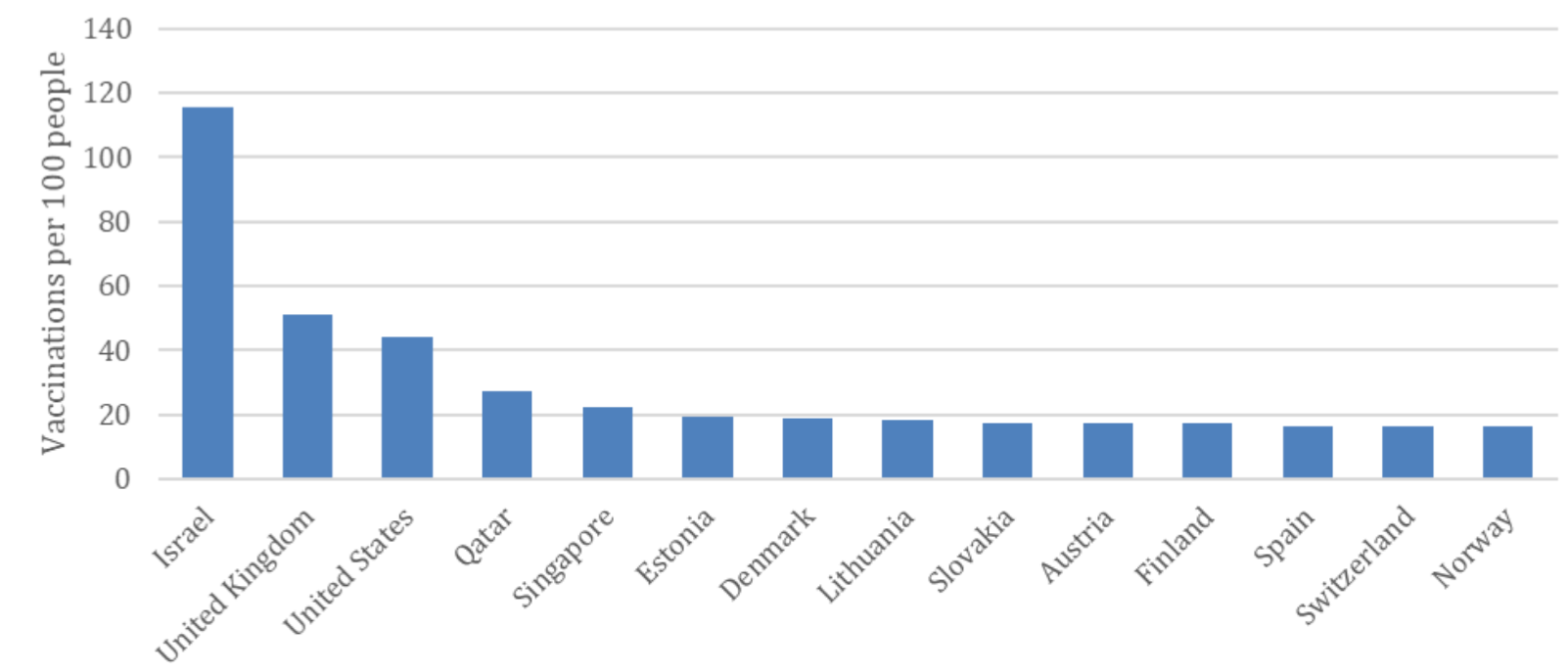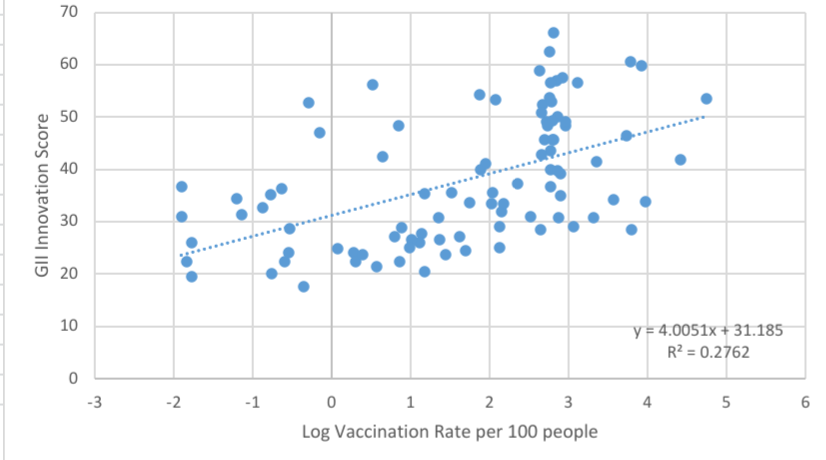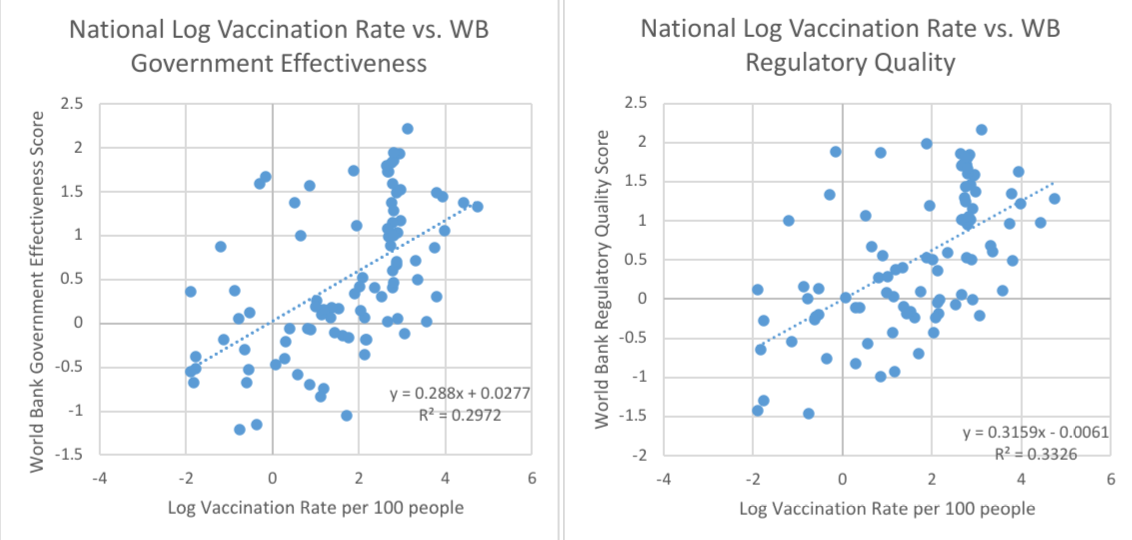Soňa Muzikárová (GLOBSEC) says countries with a reputation for innovation and strong institutions are vaccinating their populations faster.
Israel leads the world in COVID vaccinations, with over half the adult population fully jabbed. It also happens to be a highly innovative country. The fact that some of the top performers in vaccination performers also occupy top spots in global innovation rankings is hard to ignore. Israel has been dubbed a “start-up nation”, a reputation that precedes it in academia, business, and foreign relations. The UK and US also have a longstanding tradition of innovation, consistently ranking in top positions by various measures of performance.
Figure 1: Vaccination rate by country (countries with a population > 1 million and that use internationally peer-reviewed vaccines)

Source: OWGD, 2021
Within continental Europe, the Nordic countries – Denmark, Norway, and Finland – measure up to much larger and geopolitically more significant economies in terms of innovation, capitalising on their high-quality education systems and tradition in invention. The Estonian approach to digitalisation is recognised and imitated worldwide. In Central and Eastern Europe, Slovenia and Austria surpass their regional peers as local innovation hubs.
Figure 2: National log vaccination rate v GII innovation score

Source: Global Innovation Index (GII) Rankings 2020, OWGD, 2021. Note: GII innovation scores, developed by Cornell University, INSEAD, and the World Intellectual Property Organization (WIPO), serve as a yardstick for measuring innovation by the UN General Assembly, and include relevant innovation inputs (human capital, research, business & market sophistication) and outputs (knowledge, tech, and creative results).
Analysis of a sample of over 90 countries with populations over 1 million shows a positive correlation between the ability to innovate and the COVID vaccination rate. To some extent, the robustness of domestic research – especially, domestic vaccine development – may help in boosting country vaccination rates. The unparalleled speed of COVID vaccine development was predicated on a series of innovations and investments preceding the pandemic. For example, both, Pfizer-BioNTech and Moderna vaccines piggyback on the pre-COVID era synthetic messenger RNA technology – a clever variation of the natural substance that directs protein production in cells throughout the body – which was researched as early as in the 1990s. These vaccines were developed in the US and the UK, the 2nd and 3rd vaccination top performers, while Germany, where BioNTech is headquartered, has the fifth highest net vaccination rate in the world. But robustness of domestic R&D alone is not enough to explain Israel’s success. Israeli companies neither developed nor produced the vaccines that millions of its citizens are receiving, and yet it has successfully secured and distributed them to over half of its population in a few months.

The efficacy of national vaccination campaigns may also depend on less glossy fields such as manufacturing, logistics, procurement channels and practices. The agility and institutional fundamentals of the public sector are important, too, including a country’s ability to leverage existing trade links, policy foresight, and government digitalisation. A plot against the latest World Bank Governance Indicators appears to corroborate this theory. Institutional quality seems to explain roughly 30 per cent of variation in country vaccination rates.
Figure 3: Institutional quality is positively correlated with vaccination rates

Source: World Bank Governance Indicators database, 2021.
While Israel outbid its European peers on the Pfizer vaccines and agreed to retain product liability, its main asset in the vaccination race has been its highly centralised and digitalised healthcare system. Prior to the pandemic, Israel had budgeted almost $300 million to consolidate and standardise its healthcare databases, making it a prime location for large-scale medical studies requiring big data. Other vaccination frontrunners, particularly the UK, Denmark and Norway, are also notable digital government leaders.
Still, a reputation for innovation and effective governments fail to explain the lacklustre vaccination performance of some other countries, including South Korea, Japan, Thailand and New Zealand. They have done well in tackling the virus by broad testing, tracking and tracing, leveraging their experience with past epidemics and exploiting novel technologies. Although some of them are facing resurgences of the virus, they put mechanisms in place to control the pandemic early on and do not feel the same urgency to ramp up vaccinations. Europe, the US and other major blocs face a very different foe: rampant, uncontrolled spread of the virus, which threatens their healthcare systems, economies and social stability.
This post represents the views of the author and not those of the COVID-19 blog, nor LSE.





